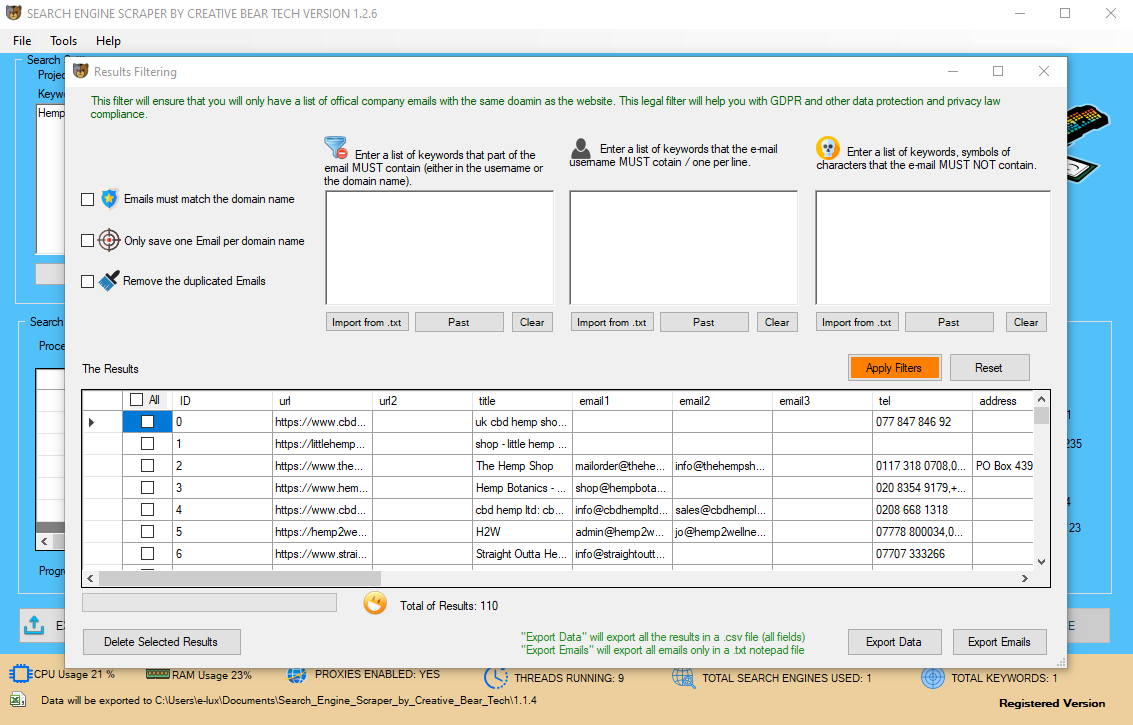Datacenter Proxies

Content
- ‘As Long As Gdpr Is Implemented By The twenty fifth Of May 2018, We Will Be Compliant With The Law’
- Myth 14: Parental Consent Is Always Required When Collecting Personal Data From Children.
- The Ico Requires Companies To Assign A Data Protection Officer
- Eu Gdpr Readiness Assessment Tool
- Keep Up To Date With Global Best Practice In Data Driven Marketing
- Myth No 2:· We Won’t Be Able To Rent Any Marketing Data.
The right to be forgotten (or proper of erasure) is not an absolute proper. It’s essential that organisations have in place a coverage to ensure that such requests are dealt with correctly. While technology undoubtedly has its part to play in serving to an organisation comply with its obligations underneath GDPR, it is not a solution. There is an ongoing debate as to who ought to lead the GDPR implementation programme, but it is agreed that GDPR compliance is the duty of everybody throughout the organisation, together with senior stage executives. Key departments which handle and course of highly sensitive and private knowledge including finance, authorized, HR and marketing, will all want to concentrate on their very own accountability and accountability. Dedicated coaching and awareness campaigns are important to ensure all workers understand how their behaviour can impression knowledge safety. Clearly being compliant with GDPR by the May 2018 deadline is what all organisations ought to be aiming for. GDPR shouldn’t be thought of as a project with a defined end date. Overall, the understanding of the value and risks around private data needed to be propagated via organisations and actively monitored. GDPR didn’t act as a reminder of what ought to be accomplished, however as an alternative as a proper new regulation. Remember to at all times request the privateness statement from the third party, and evaluation their lawful basis for processing. Whether they work underneath consent or legitimate interest, it is best for you to examine their procedures and ensure that the personal information in query has been thought-about under the same process. You might want to doc a separate process and conduct due diligence around one of the best and most suited lawful basis for accumulating and processing that specific information. However, the processing of that data continues to be subject to GDPR. Identifying a respectable interest requires organisations to obviously outline why they should process a person’s private data. It is true that information privacy compliance is going to be more challenging under the GDPR. Maximum fines for noncompliance are set on the greater of 4% of annual world turnover or €20m. However, large fines are anticipated to be reserved for serious abuses and for those making no effort to comply. The key is to do what now you can and to prioritise and document your processes. The General Data Protection Regulation (“GDPR”) will affect any business holding EU personal information no matter the place the enterprise is predicated. The GDPR additionally sets new powers for the nationwide Data Protection Authorities (DPA). And, yes, non-compliance with GDPR is associated with vital fines.
‘As Long As Gdpr Is Implemented By The twenty fifth Of May 2018, We Will Be Compliant With The Law’
If you've 250 or extra employees, then all processing actions have to be documented, nonetheless if you have less than 250 workers, therules are barely different. While some areas of GDPR could be thought-about a new requirement, the elemental rules of the new regulation are primarily based on the original EU Data Protection Directive (DPD) of 1995. In the UK, the DPD was implemented because the Data Protection Act 1988, which all organisations handling private information are legally obligated to adjust to. As a outcome, the vast majority of organisations are prone to have already got a basis of data safety compliance and may subsequently contemplate GDPR as an enhancement of the original act, somewhat than some revolutionary new regulation. May 2019 will mark the primary anniversary of the General Data Protection Regulation (GDPR), and early numbers clarify that its implementation has been a success as a breach notification legislation. It has created increased requirements for companies to deal with issues similar to security, compliance, information possession, coaching and data management. The new regulation would require Website Data Extractor, for a lot of of businesses, a fundamental change to their inner processes and ongoing give attention to compliance. The basis of the GDPR is information safety by design and by default. The GDPR’s extra stringent rules around corporations acquiring express consent for accumulating and processing customer knowledge have triggered a good amount of hand-wringing throughout the ad market. The new array of adjectives used to describe completely different forms of shopper consent — “explicit,” “unambiguous,” “knowledgeable” — are sufficient to make hearts race. “Consent is probably the most viable and maybe solely choice when it comes to some features of amassing and utilizing personal information for digital promoting functions. But, importantly, there are other ways, which can work for other features of knowledge use,” mentioned Yves Schwarzbart, head of coverage and regulatory affairs at the Internet Advertising Bureau.  So, it’s advisable not to simply wait till the ICO provides guidance on consent. In fact, there are six other ways the GDPR permits for personal information to be processed, added Schwarzbart. Most firms are complying with GDPR in order to keep away from exorbitant fines. Companies can face up to 4% of their income (which could be up to €20m). Consequently, each EU country is authorized to have separate supplemental rules regarding the GDPR. Hence, firms keen to adjust to the GDPR need to comply not only with it, but also with the supplemental guidelines adopted by particular person EU international locations. The ICO (Information Commissioner’s Office) can impose fines of as much as 20 million Euros or four% of group worldwide turnover (whichever is bigger) in opposition to each knowledge controllers and information processors. Whilst this is a huge amount of cash, it’s not what the ICO are likely to be doing 24 hours a day to businesses all over the UK. This example would be an ideal instance of how respectable curiosity would apply in a B2B advertising situation. The EU General Data Protection Regulation (GDPR) entered into pressure on the 25th of May 2018. Since that time, firms have spent billions of dollars to ensure compliance with the brand new law. GDPR consent has a excessive bar and might not be used as a ‘fallback’. Brexit has caused plenty of uncertainties in many different areas of business, both regionally and internationally. In the UK, whereas many features of our exit from the European Union haven't been confirmed, our compliance with GDPR is not certainly one of them. The new regulation will affect any organisation that collects or processes the private knowledge of EU residents or these residing inside the EU.
So, it’s advisable not to simply wait till the ICO provides guidance on consent. In fact, there are six other ways the GDPR permits for personal information to be processed, added Schwarzbart. Most firms are complying with GDPR in order to keep away from exorbitant fines. Companies can face up to 4% of their income (which could be up to €20m). Consequently, each EU country is authorized to have separate supplemental rules regarding the GDPR. Hence, firms keen to adjust to the GDPR need to comply not only with it, but also with the supplemental guidelines adopted by particular person EU international locations. The ICO (Information Commissioner’s Office) can impose fines of as much as 20 million Euros or four% of group worldwide turnover (whichever is bigger) in opposition to each knowledge controllers and information processors. Whilst this is a huge amount of cash, it’s not what the ICO are likely to be doing 24 hours a day to businesses all over the UK. This example would be an ideal instance of how respectable curiosity would apply in a B2B advertising situation. The EU General Data Protection Regulation (GDPR) entered into pressure on the 25th of May 2018. Since that time, firms have spent billions of dollars to ensure compliance with the brand new law. GDPR consent has a excessive bar and might not be used as a ‘fallback’. Brexit has caused plenty of uncertainties in many different areas of business, both regionally and internationally. In the UK, whereas many features of our exit from the European Union haven't been confirmed, our compliance with GDPR is not certainly one of them. The new regulation will affect any organisation that collects or processes the private knowledge of EU residents or these residing inside the EU.
Myth 14: Parental Consent Is Always Required When Collecting Personal Data From Children.
 It has modified how organisations acquire and handle data and private information, busting the myth that knowledge management lived within the IT division silo and making it relevant for everyone. That has required intensive investment in individuals and tools to oversee, and a re-analysis of enterprise relationships with suppliers and prospects alike. The mere point out of “private information” is often enough for B2B’ers to suppose it subsequently doesn’t apply to them. Plus there’s lots of conflicting data on the market, significantly relating to the GDPR about consent in a B2B setting. The principles round which the GDPR relies is to not punish corporations however somewhat to empower people with extra control over their knowledge and to ensure responsible collection and processing of information. Investors and M&A acquirers will want comfort that businesses are getting knowledge privacy right and it is expected that consumers and privateness teams might Website Data Extraction Software be very lively if they aren’t. The method organisations strategy GDPR and their degree of strategic planning will all have an impact on how much they end up spending. Data is at the very heart of our enterprise, and we make it our enterprise to make sure we're forward of the group in relation to understanding knowledge regulation and compliance. Everyone has been talking about the General Data Protection Regulation (GDPR) now for what looks like eternally, with most organisations now conscious and starting to understand the implications. We do know that we will need to change the best way we work in terms of how we collect and use personal information. Just the top 500 U.S. firms spent about $7.eight billion to adjust to the strict requirements of the GDPR. Despite the intensive media protection of the GDPR, many myths still encompass this rather new EU legislation. You do want a lawful foundation to use private information, however consent is not the one one obtainable. In truth, it might be preferable to depend on data processing being necessary for a contract, in your reliable pursuits, or in compliance with EU authorized obligations (as applicable).
It has modified how organisations acquire and handle data and private information, busting the myth that knowledge management lived within the IT division silo and making it relevant for everyone. That has required intensive investment in individuals and tools to oversee, and a re-analysis of enterprise relationships with suppliers and prospects alike. The mere point out of “private information” is often enough for B2B’ers to suppose it subsequently doesn’t apply to them. Plus there’s lots of conflicting data on the market, significantly relating to the GDPR about consent in a B2B setting. The principles round which the GDPR relies is to not punish corporations however somewhat to empower people with extra control over their knowledge and to ensure responsible collection and processing of information. Investors and M&A acquirers will want comfort that businesses are getting knowledge privacy right and it is expected that consumers and privateness teams might Website Data Extraction Software be very lively if they aren’t. The method organisations strategy GDPR and their degree of strategic planning will all have an impact on how much they end up spending. Data is at the very heart of our enterprise, and we make it our enterprise to make sure we're forward of the group in relation to understanding knowledge regulation and compliance. Everyone has been talking about the General Data Protection Regulation (GDPR) now for what looks like eternally, with most organisations now conscious and starting to understand the implications. We do know that we will need to change the best way we work in terms of how we collect and use personal information. Just the top 500 U.S. firms spent about $7.eight billion to adjust to the strict requirements of the GDPR. Despite the intensive media protection of the GDPR, many myths still encompass this rather new EU legislation. You do want a lawful foundation to use private information, however consent is not the one one obtainable. In truth, it might be preferable to depend on data processing being necessary for a contract, in your reliable pursuits, or in compliance with EU authorized obligations (as applicable).
The Ico Requires Companies To Assign A Data Protection Officer
The principles that underpin GDPR are largely the identical as those who apply beneath present information protection law. While there are a number of fabric adjustments, for organisations that adjust to the Data Protection Act, it ought to be a case of evolution not revolution. The ICO understands that there might be makes an attempt to breach organisations’ techniques, and that knowledge breach reporting is not going to miraculously halt legal activity.
Eu Gdpr Readiness Assessment Tool
For instance, GDPR advocates a ‘privateness by design’ method to data safety and overall security. By putting privateness and knowledge safety at the forefront of the design and implementation of latest methods, organisations can avoid the expensive and often inefficient ‘bolting on’ of privacy as an afterthought.
- By documenting processes and procedures an organisation will be placing themselves in a powerful position, should an investigation ever take place.
- Whether they work under consent or reliable curiosity, it's best so that you can investigate their procedures and ensure that the non-public knowledge in query has been thought-about beneath the same course of.
- Remember to at all times request the privacy assertion from the third party, and review their lawful foundation for processing.
- You might want to document a separate course of and conduct due diligence round one of the best and most suited lawful basis for accumulating and processing that specific data.
The ICO have stated that their major aim is to coach with regard to information protection, and that during an investigation they will be assessing the steps an organisation has taken and the danger to the information subjects. If an organisation can demonstration pro-energetic and thorough pondering, processes and procedures by way of complete knowledge planning, the ICO might be pragmatic and pro-active in assisting the organisation in becoming additional compliant. By documenting processes and procedures an organisation will be putting themselves in a strong position, ought to an investigation ever take place.
Are you looking for CBD capsules? We have a wide selection of cbd pills made from best USA hemp from discomfort formula, energy formula, multivitamin formula and nighttime formula. Shop Canabidol CBD Oral Capsules from JustCBD CBD Shop. https://t.co/BA4efXMjzU pic.twitter.com/2tVV8OzaO6
— Creative Bear Tech (@CreativeBearTec) May 14, 2020
This is as a result of in essence, the nature of GDPR is empowering quite than punitive. In the previous, numerous organisations have suffered substantial reputational damage on account of a breach of knowledge protection legislation. This is one other frequent fable, that each and every organisation needs to appoint a Data Protection Officer (DPO). The truth is that a DPO should be assigned in case your organisation is a public authority, or if it engages in giant-scale processing of personal or sensitive knowledge. And, in case your organisation doesn't meet these criteria, you do not want to assign a DPO. So, this is a determination to be made by the administration of your organization when considering the necessities of GDPR and the necessity for the DPO function. The newEuropean General Data Protection Regulation (GDPR)units new obligations and duties for Data Controllers and Data Processors. GDPR is an evolution.It’s an evolution of information protection laws which might be already in place, laws that companies already should comply with. We are presently in a “period of grace” before the GDPR guidelines are absolutely enforced, and so we should use this time wisely to completely prepare. Businesses who process the personal data of individuals located throughout the EU need to know the way they’re affected. It's like CASL however has stricter guidelines round data storage and safety, and larger fines for non-compliance. This can be a standard fantasy, that consent is required for all processing of personal knowledge. The potential fines that could be imposed have simply been said again and again to reiterate the importance of compliance for firms. However, at this level, no one can predict how strictly the authorities will impose these fines, if in any respect. They will most likely permit corporations extension and lots of leeway if they see efforts being made to conform. Fines is not going to be imposed for every little non-compliance issue. This is why the data management operate has become a businessandIT function. It requires a full dedication by every organisation to construct knowledge protection into its culture and all aspects of its operations, from help through accounting to product development. The GDPR just isn't specific to just IT, it must permeate all elements of the organisation to ensure a tradition of information privateness is built. There are several myths round who manages knowledge inside an organisation which have been challenged on account of GDPR regulations. From the shift from an IT-centric to a enterprise course of owner model, to educating inner groups and reviewing instruments, listed here are the highest five myths around management of knowledge that GDPR successfully busted. And, if withdrawn, the controller and processor must cease processing that personal knowledge. So, the selection to make use of consent as the legitimate objective ought to be evaluated carefully. One of the goals of the GDPR was to create a harmonized EU legal framework that will apply immediately in all EU nations. Although this objective was achieved to some extent, individual EU nations still have discretion with regard to certain elements of the legislation. It is necessary to notice that companies that fail to notify the Information Commissioner’s Office of safety breaches shall be answerable for a fantastic, especially regarding an individual’s information. Companies might have to alert their entire customer base in the case of a breach, which may affect their status. Consent is the most commonly recognized and practiced lawful basis of processing used by organisations at present, however the new GDPR has inflexible guidelines surrounding consent. If it’s your chosen path, you then’ll have to intricately examine your ongoing systems for consent and refresh them accordingly. The main question is –how will this affect the world of B2B marketing? The reality is that GDPR is applicable to all firms that process the personal knowledge of EU residents. So, a lot of non-European companies, particularly these within the Americas and Asia, will fall within the scope of GDPR and will need to adjust to it. But the law will raise the extent of safety and privateness protections throughout the board. On the face of it, firms can course of and profile personal knowledge under respectable pursuits rather than precise consent in some circumstances. Organisations ought to have a look at why and how they are processing personal information. Be cautious of anyone offering a product or service that is GDPR certified or that promises to make you GDPR compliant. Encryption is talked about in GDPR as being one of many tools that organisations can use to assist shield private knowledge, and it might help cut back the risks to people if there's a knowledge breach. However, the unlucky fact is that not all information being shared about GDPR is factual. The World Wide Web consists of more than 1.5 billion web sites. Many of these websites sell goods and/or companies to EU residents and fall inside the scope of the GDPR.  The reality is that consent is likely one of the six reliable purposes, and never the only choice to process private data. And, in my opinion, this should not be the starting point when corporations think about the processing of non-public data. I say this as a result of consent can be withdrawn by the data subject. Phil Lee, CIPM, CIPP/E, takes on 10 in style General Data Protection Regulation miscommunications in a report for Fieldfisher’s privateness regulation blog. When leveraging respectable interest because the lawful foundation of processing personal data, you have to also ensure that the rights and freedoms of the data topic are not compromised. Are they likely to be personally negatively affected by your message? If so, then it is doubtless that your message will not be compliant with GDPR. In reality, after you have reached compliancy, there shall be a relentless have to replace and review practices to keep up and proceed best follow. Data Protection Impact Assessments (DPIA) are an example of this, whereby any new follow, software program or processing technique is assessed totally prior to make use of, minimising any potential threat to a person’s knowledge privacy. For instance, should you use a social platform, guarantee it permits customers to set their very own profile settings in essentially the most privacy-pleasant way, to collect the minimal data you need. One of the adjustments beneath GDPR is that information processors, such as cloud service providers, will purchase direct obligations under knowledge safety legislation. Those obligations include info security, document preserving and notifying knowledge controllers of private knowledge breaches. However, the organisation using a cloud service nonetheless retains total accountability for the choice to use that provider and for guaranteeing that the processing complies with GDPR. One of the extra memorable aspects of the GDPR is the fines if a company doesn’t comply with the Regulation. Therefore, to comply with the legislation, your organization needs to attend to safety fundamentals. First, determine the most important risks and make plans to mitigate them. And the purpose of processing or profiling may be totally apparent. Nevertheless, it’s essential that the objective is clearly articulated and communicated to the individual. Another essential side of the GDPR which will affect B2B advertising is the requirement to document all processes related to personal information. Whilst it will be time consuming, by documenting processes and procedures it's likely that you will find additional enterprise benefit by having better structures in place and a greater framework for all information flowing by way of the business. It’s the elephant within the room for organisations in all places- the General Data Protection Regulation, or theGDPR.
The reality is that consent is likely one of the six reliable purposes, and never the only choice to process private data. And, in my opinion, this should not be the starting point when corporations think about the processing of non-public data. I say this as a result of consent can be withdrawn by the data subject. Phil Lee, CIPM, CIPP/E, takes on 10 in style General Data Protection Regulation miscommunications in a report for Fieldfisher’s privateness regulation blog. When leveraging respectable interest because the lawful foundation of processing personal data, you have to also ensure that the rights and freedoms of the data topic are not compromised. Are they likely to be personally negatively affected by your message? If so, then it is doubtless that your message will not be compliant with GDPR. In reality, after you have reached compliancy, there shall be a relentless have to replace and review practices to keep up and proceed best follow. Data Protection Impact Assessments (DPIA) are an example of this, whereby any new follow, software program or processing technique is assessed totally prior to make use of, minimising any potential threat to a person’s knowledge privacy. For instance, should you use a social platform, guarantee it permits customers to set their very own profile settings in essentially the most privacy-pleasant way, to collect the minimal data you need. One of the adjustments beneath GDPR is that information processors, such as cloud service providers, will purchase direct obligations under knowledge safety legislation. Those obligations include info security, document preserving and notifying knowledge controllers of private knowledge breaches. However, the organisation using a cloud service nonetheless retains total accountability for the choice to use that provider and for guaranteeing that the processing complies with GDPR. One of the extra memorable aspects of the GDPR is the fines if a company doesn’t comply with the Regulation. Therefore, to comply with the legislation, your organization needs to attend to safety fundamentals. First, determine the most important risks and make plans to mitigate them. And the purpose of processing or profiling may be totally apparent. Nevertheless, it’s essential that the objective is clearly articulated and communicated to the individual. Another essential side of the GDPR which will affect B2B advertising is the requirement to document all processes related to personal information. Whilst it will be time consuming, by documenting processes and procedures it's likely that you will find additional enterprise benefit by having better structures in place and a greater framework for all information flowing by way of the business. It’s the elephant within the room for organisations in all places- the General Data Protection Regulation, or theGDPR.
Beauty Products & Cosmetics Shops Email List and B2B Marketing Listhttps://t.co/EvfYHo4yj2
— Creative Bear Tech (@CreativeBearTec) June 16, 2020
Our Beauty Industry Marketing List currently contains in excess of 300,000 business records. pic.twitter.com/X8F4RJOt4M
Under GDPR, some organisations can also require the appointment of a Data Protection Officer (DPO). Acting independently from the rest of the business, the DPO is the first point of contact for all GDPR queries and reviews into senior administration. The ICO web site explains intimately both the criteria for needing a DPO as well as their full duties. Regardless of whether or not you're legally required to have a DPO, the collaborative working of the c-suite with each department inside their organisation is a key success issue of implementation and continued compliance. Data administration used to be solely an IT function but, since GDPR came into force, organisations have been more and more realising the criticality and value of their information belongings.
Myth No 2:· We Won’t Be Able To Rent Any Marketing Data.
Massive USA B2B Database of All Industrieshttps://t.co/VsDI7X9hI1 pic.twitter.com/6isrgsxzyV
— Creative Bear Tech (@CreativeBearTec) June 16, 2020
The ICO labelsLegitimate Interestas “essentially the most flexible” of all lawful foundation of processing, and it's doubtless that knowledge processing for most B2B marketing departments will sit comfortably inside this basis. In essence, it allows you to process private information on the grounds that your organisation is working in the direction of the respectable curiosity of the individual – this can embrace industrial interests. This is one of the commonest myths, that GDPR is an EU legislation and it applies to EU firms only. 